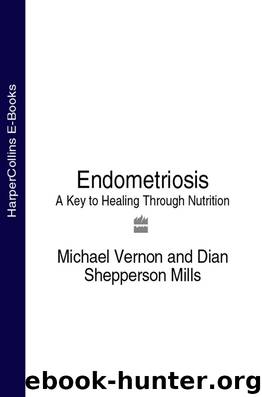Endometriosis by Michael Vernon

Author:Michael Vernon
Language: eng
Format: epub
Publisher: HarperCollins Publishers
Published: 2017-01-23T16:00:00+00:00
GOOD GUT FLORA
Surely no man can live without friends.
Aristotle
About 2kg/4lb of friendly bacteria live in our intestines. We provide them with food and warmth and, in return, they help us digest foods, and they support immunoglobulin production. The good bifido bacteria make vitamins B and K. This is symbiosis – you scratch my back and I’ll scratch yours. Drawing upon research findings, it is estimated that there are ‘100 trillion organisms in our intestinal tract – 400–500 different species with an active metabolic action equivalent to the liver’.13 There is so much vibrant life inside us, which acts to protect us from harm if you look after it carefully.
The gastrointestinal tract acts as a strong barrier between us and the outside world. Think of the good gut flora as our protective atmosphere. Just as the atmosphere around planet Earth helps to protect it from radiation and meteorites, all these good bacteria are shielding and screening us from the dangers of parasites, viruses and bacteria lurking in food and water.
Three pounds of bifidobacteria and one pound of Bacteroides bacteria live inside us. The bifidobacteria are the ‘good’ guys who produce B-complex vitamins and vitamin K. The bacteroides bacteria are required to break down protein foods; in doing so they produce gases. Drugs such as antibiotics upset this balance. Antibiotics are ‘anti-life’ and kill off all bacteria whether good or bad, whereas probiotics, such as acidophilus, are ‘for-life’ and help to restore the levels of bifido-bacteria to normal. It is important to keep the ratio of three bifido-bacteria to one bacteroides bacterium in balance, by eating live yoghurt or acidophilus after antibiotic or hormonal drug treatments, or if you are suffering from severe stress. If there is an excess of bacteroides, too much gas will be produced; if there is too little bifidobacteria, insufficient levels of vitamin B-complex will be produced to keep the gut membranes healthy.
We have often been taught that bacteria are all bad, but here within us, we have some of the best bacteria one could ever wish for; they keep us in the peak of health if we look after them. The use of drugs (such as antibiotics, the oral contraceptive pill, HRT or other hormone drugs, indigestion tablets, non-steroidal anti-inflammatory drugs [NSAIDs]), sensitivity to gluten in wheat, even severe ongoing stress, take their toll.
In some cases, long-term antibiotic therapy may induce liver problems.14 Antibiotics frequently produce profound changes in the composition of the human intestinal microflora, permitting the overgrowth of resistant endogenous bacteria or colonization by organisms acquired from the outside environment.15 Once antibiotics have killed both the good and bad bacteria in the gut, they will have broken down the body’s natural barrier of protection against infection. Pathogenic organisms may then gain a foothold and proliferate, and their overgrowth may produce serious infections in the host as the precious living gut flora system is left defective. If the gut is injured, we are very likely to develop ill health. Agents of disease are able to pass through a damaged gut, and may enter the bloodstream and infect any organ in the body.
Download
This site does not store any files on its server. We only index and link to content provided by other sites. Please contact the content providers to delete copyright contents if any and email us, we'll remove relevant links or contents immediately.
Men In Love by Nancy Friday(5240)
Everything Happens for a Reason by Kate Bowler(4743)
The Immortal Life of Henrietta Lacks by Rebecca Skloot(4588)
Why We Sleep by Matthew Walker(4445)
The Sports Rules Book by Human Kinetics(4386)
Not a Diet Book by James Smith(3426)
The Emperor of All Maladies: A Biography of Cancer by Siddhartha Mukherjee(3163)
Sapiens and Homo Deus by Yuval Noah Harari(3071)
Day by Elie Wiesel(2783)
Angels in America by Tony Kushner(2662)
A Burst of Light by Audre Lorde(2607)
Endless Forms Most Beautiful by Sean B. Carroll(2483)
Hashimoto's Protocol by Izabella Wentz PharmD(2375)
Dirty Genes by Ben Lynch(2318)
Reservoir 13 by Jon McGregor(2302)
And the Band Played On by Randy Shilts(2209)
Wonder by R J Palacio(2207)
The Immune System Recovery Plan by Susan Blum(2058)
Stretching to Stay Young by Jessica Matthews(2045)
